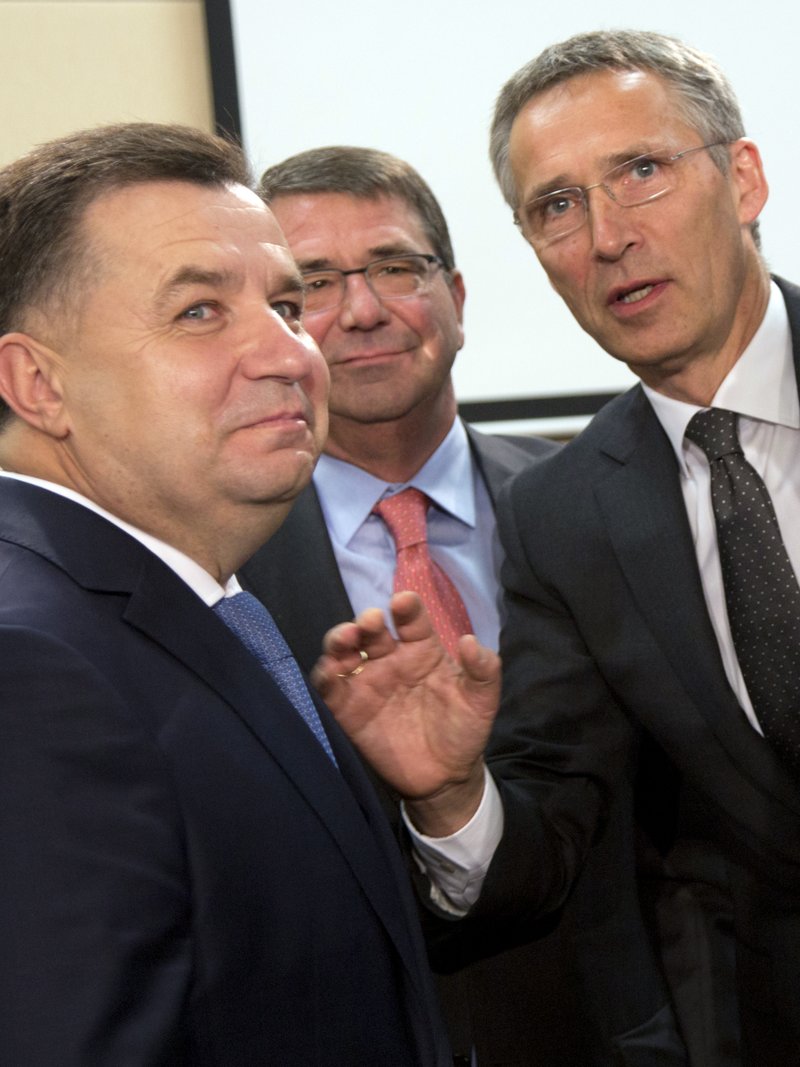BRUSSELS -- Russian President Vladimir Putin isn't finished using his military in eastern Ukraine, the top U.S. military commander for NATO said Thursday as the U.S. and its allies outlined additional support for Kiev.
U.S. Gen. Philip Breedlove, NATO's supreme allied commander, said there continues to be a constant flow of ammunition and other military supplies from Russia across the border to Ukraine and a well-trained and ready Russian force.
"Mr. Putin is very clear that he does not want Kiev leaning to the West and that he will use the appropriate force necessary to keep Kiev from leaning to the West, and so for that reason, as you know, Kiev remains leaning to the West," Breedlove said in Brussels.
"And so, I don't think Mr. Putin is done in eastern Ukraine."
NATO Secretary-General Jens Stoltenberg earlier warned of a return to heavy fighting in eastern Ukraine and said the alliance is creating a new trust fund that will help pay for efforts to remove mines and detect and destroy homemade bombs.
Those steps, he said, will be vital for saving lives in a conflict that has killed more than 6,000 people.
In addition, he said, NATO is working to better secure the airspace in the region.
He said Poland, Norway and Turkey will be sharing more airport traffic control data with Ukraine, which is critical because it's "an area which is unstable and where we see fighting going on, on the ground."
A Malaysian airliner leaving Amsterdam was mistakenly shot down over eastern Ukraine last year.
U.S. Defense Secretary Ashton Carter, meanwhile, gave allies more details on the military support the U.S. will provide to a NATO rapid-response task force.
The U.S., he said, will commit to sending troops, aircraft and other equipment in 10 different categories, including special operations forces, intelligence and surveillance, transportation, refueling, Air Force and Navy aircraft and support, precision weapons, combat helicopters and a command post.
Their comments came as the U.S. and other allied defense ministers met to hammer out additional ways they can bolster the defenses of Ukraine, which is not a NATO country.
Russia annexed Ukraine's Crimea region last spring, and pro-Russia Ukrainian separatists in the east have engaged in what amounts to a civil war.
Moscow denies helping the Ukrainian rebels.
While the U.S. and NATO have so far refused to provide weapons to Kiev, Ukrainian Defense Minister Stepan Poltorak said defense ministers from NATO countries told him they would be ready to reconsider if the attacks against his government forces in the east escalate.
But "nobody promised to us tomorrow they will supply us with lethal weapons, no," Poltorak said.
Breedlove said Russia maintains a very efficient force east of the Ukraine border, and that there is a constant flow of supplies, men and soldiers back and forth.
"The Russians command, lead and enable a very capable force inside the Donbass that is also extremely well supplied," said Breedlove, describing a region of eastern Ukraine.
He said there have been more than 30 supply missions to the Russian-backed separatists in Ukraine.
U.S. and European officials also worry about suggestions from Russia that it might use nuclear weapons in a territorial dispute like the one over Crimea.
At a congressional hearing Thursday in Washington, the vice chairman of the Joint Chiefs of Staff, Adm. James Winnefeld, said, "It's very important that the Russians understand that far from being de-escalatory, first use of nuclear weapons in a conflict like that risks uncontrolled escalation."
Carter has rolled out plans for the Pentagon to provide additional military assistance to Europe, to help reassure allies who feel threatened by Russia's aggression as well as terrorist groups, including the Islamic State.
He told allies the U.S. will spread about 250 tanks, armored vehicles and other military equipment across six former Soviet bloc nations, and also will be willing to provide, when needed, weapons, aircraft and forces, including commandos, to supplement NATO's new very high readiness task force.
As part of that effort, a U.S. Marine Corps unit equipped with tanks, light armored vehicles and artillery will be sent to Bulgaria this fall, Brig. Gen. Norman Cooling said Thursday.
During the NATO meeting, allies have insisted they are not looking to restart a Cold War-style arms race with Russia, but are working to address the threats that alliance nations are facing.
But Putin said Thursday that Russia needs a mighty military to fend off threats near its borders.
Speaking at Thursday's Kremlin meeting with graduates of Russian military academies, Putin also vowed to continue a sweeping military modernization effort that envisions the purchase of large numbers of new weapons.
Despite the fact that oil-rich Russia is now in a recession, Putin's plan aims to spend more than $400 billion through 2020 to give the armed forces dozens of navy ships, hundreds of new planes and missiles and thousands of tanks and other weapons.
Putin added that Russia has no aggressive intentions and aims to "settle any disputes exclusively by political means with respect to international law and interests of other nations."
Information for this article was contributed by David Rising, Alison Mutler and Vladimir Isachenkov of The Associated Press.
A Section on 06/26/2015

